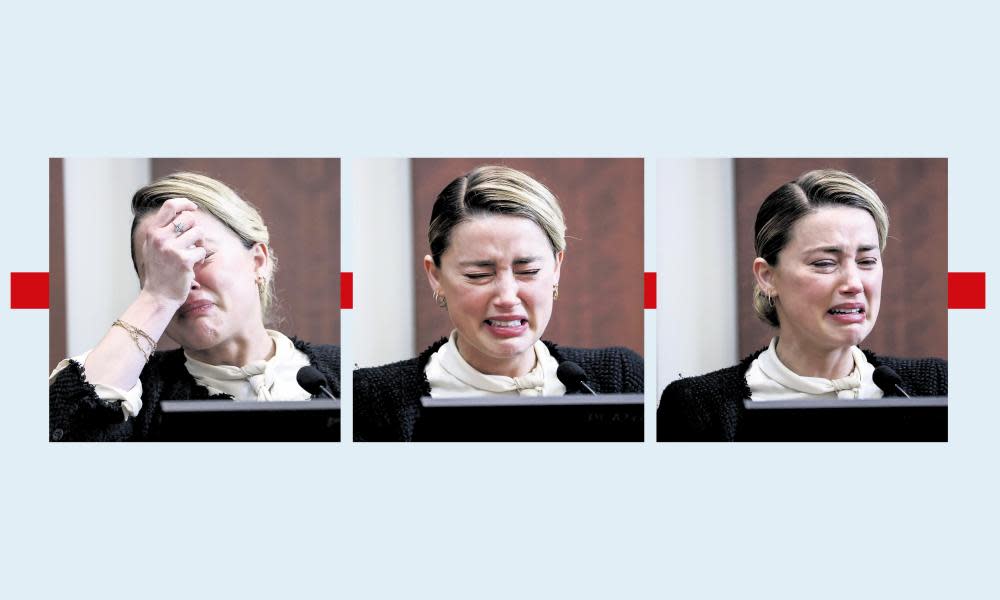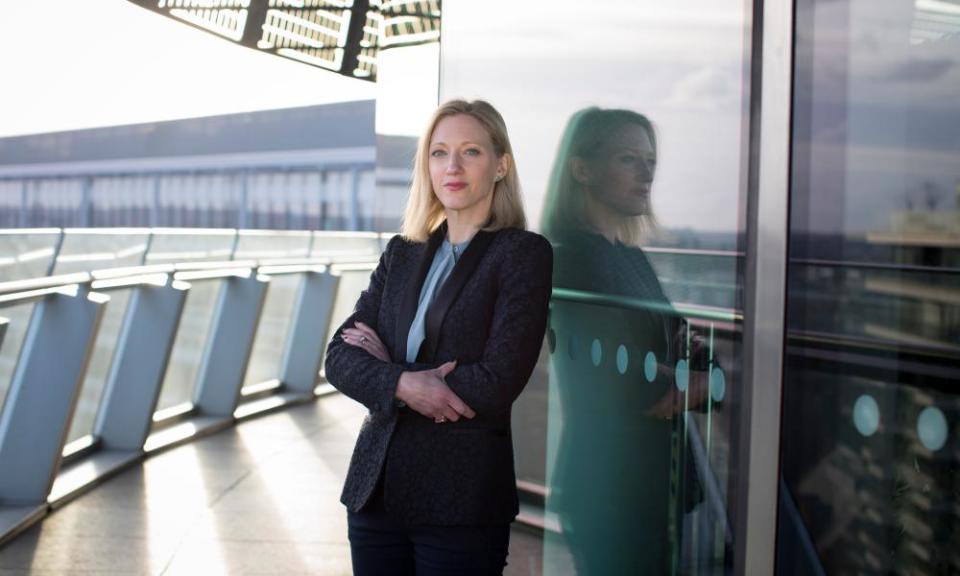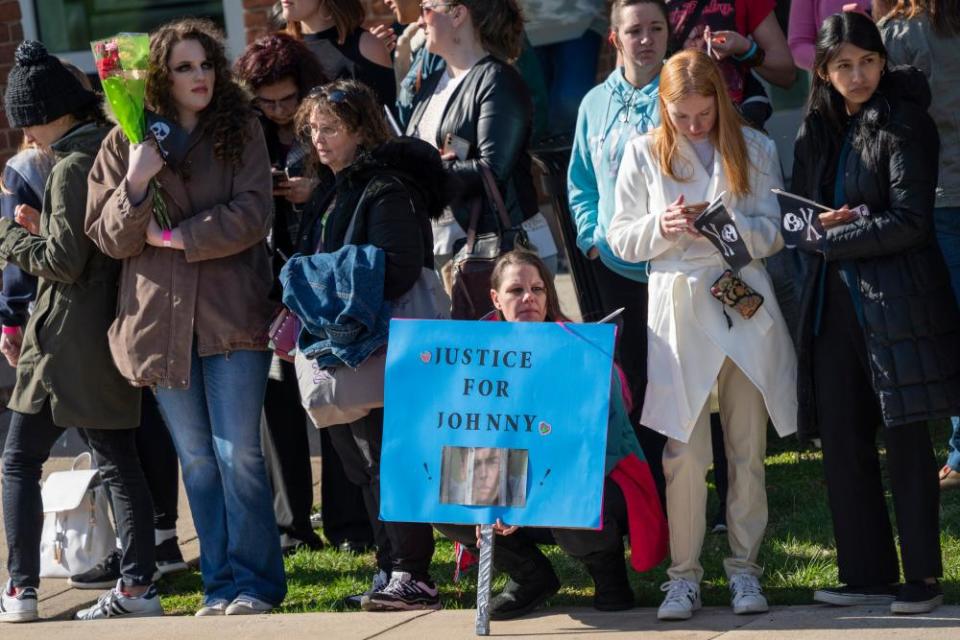‘It’s harmful and humiliating’: how Amber Heard’s haters undermine the victims of domestic violence

TikTokers and tweeters are having the time of their lives mocking Johnny Depp’s ex-wife. What message does this send to women abused or assaulted by their partners?
A young woman sits on the stairs, hair scraped back, lower lip trembling. She starts to talk about being slapped in the face, and something about the words is instantly familiar. They’re taken from the actor Amber Heard’s gruelling court testimony earlier this month, describing the abuse she claims to have suffered at the hands of her ex-husband, the film star Johnny Depp. Only now these words are being mockingly rehashed – and not just by this one account, belonging to a Canadian beauty business owner using the handle @sansanjovs, but across the social media platform TikTok.
Exaggerated re-enactments of iconic movie scenes are popular on the site, and the same trick has been used to skewer statements from politicians. But there’s something more disturbing about seeing it applied to a court case involving allegations of domestic violence. Depp is suing his ex-wife in the US for defamation over a newspaper essay she wrote in 2018. Although the Washington Post article named no names, Depp argues it clearly implicated him and that his ex-wife was “not a victim of domestic abuse, she is a perpetrator”; she is countersuing for alleged smears against her.
Wall-to-wall coverage of this case, televised in the US and live-streamed worldwide on YouTube, will have reawakened painful memories for many survivors. Yet for some on social media, the sight of Heard breaking down on the witness stand as she accused her ex-husband of sexually assaulting her with a bottle (claims he denies) seems to be just another form of entertainment, a juicy box set or episode of Love Island to be chewed over with friends.

Posts debunking supposed inconsistencies in Heard’s evidence have gone viral, alongside footage of a Starbucks in California that reportedly put out two tip jars – one labelled with Heard’s name, the other Depp’s – so customers could “vote” for their favourite, as if on a reality TV show. While Depp’s jar appears stuffed with dollar bills, Heard’s looks forlornly empty. As the psychologist Dr Jessica Taylor, of the anti-victim-blaming group Victim Focus, tweeted last week: “The fact that a man going into court to face his ex-wife giving extremely graphic testimony of sexual assault and abuse is met with gifts, fans, banners, women crying and men high-fiving him is pretty jaw-dropping no matter your views on this case.”
It’s quite common for women who allege abuse in the family courts to be told they’re mentally unwell
Perhaps it’s the sight of two Hollywood actors facing off on screen that has encouraged this sense of almost theatrical unreality, with Depp’s team dismissing Heard’s testimony as “the performance of her life”. But few of those sharing the Twitter hashtags #Justiceforjohnny or #amberheardisaliar seem bothered that two years ago Depp lost a libel case over an article in the Sun claiming he was a “wife-beater”, with a British judge ruling the story to be “substantially true”. Teenagers getting their news from TikTok memes or out-of-context clips on Instagram, meanwhile, may have no idea of the longer legal history. And while this excruciatingly public trial is in some ways uniquely American – British courtrooms aren’t televised, sexual assault victims here have a right to anonymity, and witnesses in domestic abuse cases can testify from behind screens – British domestic violence campaigners now fear the public mockery of Heard risks deterring victims here from coming forward, for fear of being belittled and disbelieved.
“A woman recounting [what she claims is] her experience of domestic violence in itself is traumatic for many survivors. But that evidence being not just denied, but ridiculed, is deeply harmful and humiliating,” says Ruth Davison, chief executive of the domestic violence charity Refuge. “This is a real trial. The humorousness [around] what’s actually deeply offensive worries me.” Whatever the ultimate verdict in this case, the public response to it sheds a disturbing light on how misogyny persists even in a supposedly “woke” generation.
For many working in the field, that response illustrates some wearily familiar tropes: that if it was really so bad she should have left sooner (on average it takes seven attempts before a woman leaves an abusive partner, according to Refuge); that she’s a “crazy ex”, seeking attention or a hefty divorce settlement; that he is so likable he couldn’t possibly have done it.
Yet it’s far from unusual, Davison says, for perpetrators to seem “nice”. “These are all characteristics of abusers – that they can lovebomb you, that they’re incredibly charming.” And, while well-loved celebrities may seem more likely to enjoy the benefit of the doubt, she points out that in real life victims themselves can initially find it hard to acknowledge that the man they love is abusive, telling themselves his behaviour was simply out of character.
Perhaps the most pervasive trope, however, is that there is such a thing as a “model” victim against whom others can – and should – be judged. Heard has been criticised for crying too much, or not crying enough; one popular online theory is that her occasional glances in Depp’s direction and his reluctance to make eye contact show he’s more frightened of her than the other way round.
London’s victims commissioner, Claire Waxman, is a regular observer of family courts. She frequently meets abuse survivors and has been the victim of stalking in the past. There is, she says firmly, no such thing as a typical way to behave on the witness stand. “Some victims are completely devoid of any emotion, and that doesn’t mean it didn’t happen. They are disconnected – it’s quite a normal response to trauma. Whereas others can’t even put a sentence together because they’re crying so much, and that’s normal, too.”

But when Waxman tweeted that she had found aspects of the public response to the case “nothing short of shocking”, she was bombarded with comments accusing her of being “trash”, or “schizophrenic like her”. (A psychologist hired by Depp’s team gave evidence that she had diagnosed Heard as suffering from a borderline personality disorder and so-called histrionic personality disorder, only for the psychologist hired by Heard’s team to testify that she had diagnosed instead post-traumatic stress disorder triggered by abuse). The suggestion that survivors are mentally unstable is also familiar, says Waxman, with even problems triggered by the abuse itself sometimes twisted and weaponised against women in court. “It’s quite common for women who allege abuse in the family courts to be told they’ve got personality disorders, they’re mentally unwell, they’re unbalanced. It’s misunderstanding the impact of abuse, the response to it and the trauma that they may have.”
The minimising and mockery of Heard’s allegations online are already, Waxman thinks, making women hesitate over reporting similar stories. “It feels like we’re undoing years of work. I’ve been contacted by victims who are deeply distressed by the coverage, and professionals supporting victims who are really questioning ‘Am I worthy of being believed? Would I want to disclose and get that response that [we’re] seeing?’”
We live in a misogynistic world, and therefore what we think is normal is misogynistic, whether we’re male or female
“I’ve had pushback from some people saying: ‘Well, if she made a false allegation then we have to call it out’,” says Waxman, “but it’s fuelling the misconception that false allegations of abuse and sexual abuse are rife. They’re not.” Home Office research suggests only around 3% to 6% of rape allegations are false, she says; in such cases the truth should be established by police and courts in possession of all the evidence, not amateur trial by social media. While Waxman praises the government’s recent “Enough” campaign, encouraging Britons to challenge coercive and abusive behaviour where they see it in public, she worries about teenagers’ broader attitudes being shaped by the virulent attacks on Heard by Depp supporters.
Men’s rights activists have also been vocal in support of the Pirates of the Caribbean star, and see this case as opening wider conversations about divorce or illuminating the plight of battered men. (The 2018 ONS Crime Survey for England and Wales found 4.3% of men experienced domestic abuse in the previous year, compared with 7.5% of women, although men were less likely to report it to police; according to the separate Scottish Crime and Justice Survey, most perpetrators of domestic violence against men were female.) More startling, however, is that many of the Heard-baiters on social media or fans mobbing Depp outside court are young women closer to Heard’s age of 36.
To Davison, that’s not so surprising. “We live in a misogynistic world, and therefore what we accept is normal, what we think is normal, is misogynistic, whether we’re male or female.” Arguably, the pro-Depp hashtag #abusehasnogender, shared online by both men and women, may also have particular resonance for younger people used to rejecting crude gender stereotypes.

Certainly one thing that makes this case particularly incendiary is that Heard herself was arrested in 2009 on suspicion of assaulting her then girlfriend, Tasya van Ree. All charges were dropped and van Ree has subsequently insisted Heard was “wrongfully” accused, by police who “misinterpreted and over-sensationalised the incident”. But a recording played in court of Heard apparently admitting to hitting Depp has also prompted widespread debates about whether so-called mutual abuse – where both partners are violent towards each other – genuinely exists, or whether it’s an accusation largely levelled by perpetrators to muddy the waters.
Without passing judgment on what may or may not have happened in this particular marriage, Davison says domestic abuse classically involves an imbalance of power, allowing one partner to control the other. “We don’t subscribe as Refuge to the idea that a relationship is abusive – that starts to muddle things. A perpetrator can be abusive, and it is always a perpetrator’s choice to abuse. I think once you start to call a relationship abusive or toxic, it starts to apportion blame to the victim.” She adds: “What’s also commonly known in domestic abuse is the concept of DARVO – the perpetrator Denying, then Attacking, then Reversing the Victim-Offender role.”
Related: Depp v Heard: second week of trial takes sheen off celebrity glamor
The key lesson Davison draws from the furore surrounding the trial, however, is social media’s growing role in amplifying abuse and manipulation.
It’s rare now for reports of domestic violence not to include attempts to threaten, humiliate or pursue victims online, says Davison, and persuading tech platforms to take down more subtle forms of harassment isn’t always easy. Posting a picture of a woman standing outside her own house, for example, might seem harmless – but not if the message is that an abuser knows where she now lives. Davison recalls the story of a woman who went on one date with a man she met via a dating app, in a public place well away from home. “She didn’t want to see them again. But they managed to identify where she lived by cyberstalking effectively, [using] information that was in the public domain, and started posting photos on social media of her front door. You can’t say how terrifying that must be, and yet that is an everyday experience that we’re finding.”
Refuge now has a specialist tech team that can help survivors get abusive material taken down, working closely with the major platforms. But Davison is hoping an online safety bill being taken through parliament by the culture secretary, Nadine Dorries, which seeks to regulate behaviour deemed “legal but harmful”, could strengthen such protection.
And in the meantime, what would she like abused women following the case to know? “If you’re feeling distressed by this, if it’s making you realise your own situation is abusive, if you’re feeling retraumatised – Refuge does believe you. We are here for you.” It may be some time, sadly, before the rest of society can say the same.
In the UK, call the national domestic abuse helpline on 0808 2000 247, or visit Women’s Aid. In Australia, the national family violence counselling service is on 1800 737 732. In the US, the domestic violence hotline is 1-800-799-SAFE (7233). Other international helplines may be found via www.befrienders.org

 Yahoo Movies
Yahoo Movies 
